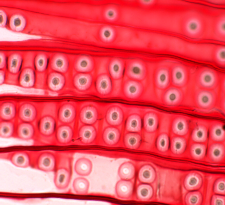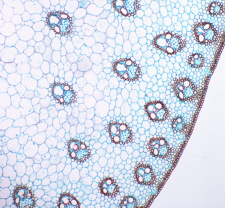PLSCI 2470 - Plants and Cultures around the World
Spring. 3 credits. Limited to 36 students.
Offered alternate years.
Instructor: Dr. M. A. Gandolfo.
The course explores the economic and agricultural importance of plants to people. Topics include an introduction to plant science from molecules to ecosystems, and the role of plants as sources of shelter, food, fiber, and medicine. You will gain an appreciation of the connection between plants and people in our everyday lives. You will understand the fundamental concepts of the value of plants within different areas (agriculture, medicine, etc.), the interactions among plants, people and the biosphere and the role of people and plants in relationship to climate change. Labs include lots of on-hand activities (including making beer, baking bread, and make peanut butter and hummus) and field trips. Meets the science requirement for non-majors.
PLSCI 3450/PLSCI 5450 - Basic Plant Anatomy
Fall. 3 credits. Limited to 15 students. 
Prerequisite: introductory course in biology or botany or permission of instructor. May not be taken for credit after PLSCI 3470. Lec, lab.
Offered alternate years.
Instructor: Dr. M. A. Gandolfo.
Descriptive course with equal emphasis on development and mature structure. Lecture, laboratory, and reading are integrated in a study guide. The laboratory offers the opportunity to develop the practical skills required to make anatomical diagnoses and to write anatomical descriptions.
This course will expose students to a variety of anatomical data and concepts while giving them the tools to gain the ability to perform practical diagnoses on anatomical "unknowns". The course is basic for anyone interested in plant development, horticulture, genomics, and systematics. It is constructed on the basics and oriented to any discipline associated to Plant Sciences. At the end you will build an appreciation for the content and organization of the plant body.
PLSCI 3470 - Plant Histology of Model Organisms
Spring. 3 credits. 
Prerequisite: introductory course in biology or botany, or permission of instructor. May not be taken for credit after PLSCI 3450. Lec, lab.
Offered alternate years.
Instructor: Dr. M. A. Gandolfo.
The goal of this course is to introduce to the students the plant histology of specific model organisms within a phylogenetic framework. The course consists on three major topics as follow: 1- Revision of general plant anatomy (meristems, tissues, cell types, etc.), 2- Review of plant structures (root, stem, leaf, flower), and 3- Structure and histology of four monocots and four dicots. For topic 3 emphasis will be on apical meristems of shoots and roots, quiescent center, intercalary meristems, origin of leaf primordia, leaf and flower and inflorescence development, etc. The selected “plant model organisms” are the monocots C4 Sorghum and Zea and C3- Triticum and Avena, and for the dicots Lycopersicum, Arabidopsis, Borago and Nicotiana. These taxa were chosen because they are commonly used in genetic, development, and genomics studies. Knowledge accumulated throughout the lectures will be used during the labs. The labs will include mostly “hands-on” activities complemented with slides already prepared by the instructor and those available from the Plant Anatomy collection.
PLSCI 4841/PLSCI 6848 Plant Form and Function: Anatomy, Cell Biology, and Development
Spring. 3 credits.

Prerequisites/Corequisites Prerequisite: PLSCI 4831, BIOMG 2800 or PLSCI 2250 or permission of instructor.
Instructor: Dr. M. A. Gandolfo and Dr. A. Roeder
This course is broken into three sections focusing on plant anatomy, cell biology, and development. In each section, we will discuss our current understanding of the key concepts, talk about some of the remaining open questions, and describe the techniques used in research to address these questions. Topics covered will include: cell versus organismic theory, meristems, organs, anatomical evolution, the cytoskeleton, cell wall, cell growth, cell division, advanced microscopy, subcellular trafficking, cell differentiation, pattern formation, intercellular signaling, and plant hormones.
PLSCI 7490 - Graduate Research in Botany
Fall and Spring. 1-9 credits
Instructor: Dr. M. A. Gandolfo.
This course is intended for graduate students who are working with faculty members on an individual basis.